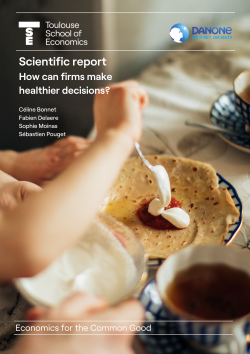How can firms make healthier decisions?
Measuring the impact of Corporate Social Responsibility (CSR) strategies is increasingly important. Improving the evaluation of these strategies becomes crucial.
TSE researchers Sophie Moinas and Sébastien Pouget teamed up with Fabien Delaere, Director of Impact Assessment for Danone's health strategy, to produce a report on the health costs of added sugars. This report proposes an integrated valuation tool that allows responsible companies to account for their impacts on society.
In a parallel study, Céline Bonnet provides an empirical method to assess the societal impact of manufacturers in the French dessert market, once the social cost of sugar is accounted for.
This report is a product of the TSE-Danone research partnership. Danone Research has been a partner of TSE's Sustainable Finance Center and Health Center since 2021.
> Have a look to the key recommendations of this report:
For effective metrics
- The social cost and benefits of nutrients should be computed per country, based on individual characteristics including age, gender, occupation, and income.
- Reliable societal impact metrics should consider consumer substitution patterns, as well as competitors’ quality of products and pricing strategies.
For regulators
- Regulators must improve access to data – at the country level, and possibly by social group – on consumption habits, disease prevalence, risk association, and healthcare costs.
- Regulators will need to monitor the independent private institutions engaged in the audit and certification of firms’ CSR reports. Regulatory oversight can also normalize the social costs of the various corporate impacts.
- Regulators should use transparent methods to adjust taxes to match the social cost of externalities. Together with clear reporting standards, this will help firms to assess their impact or the probability of future taxes.
For firms and investors
- The disclosure of data on sales of nutrients – per country/region (and possibly by group of customers) – will improve the assessment of a firm’s societal impact.
- When assessing their impact, in the absence of data on consumption patterns, firms may be able to apply different social costs of sugar by category of products (e.g., targeted to children vs adults).
- For their stakeholders to assess firms’ societal impact, firms must precisely communicate their CSR strategy’s expected impact on the growth of sales.
- When using integrated valuation tools, the parameter for the firm’s willingness to internalize its impact should be fixed by the firm’s governing bodies (e.g., shareholders, corporate directors, CSR committee).
- Sharing good practices on accounting for societal impacts can trigger a dynamic shift and allow firms to benefit from each other’s experience.
- Integrated valuation offers asset managers a reliable alternative to existing best-in-class strategies based on ESG ratings.
Just for desserts - Lessons from the French market
- The presence of some dessert manufacturers improves consumers’ sugar intake from this sector.
- Dessert makers can improve industry profits without additional sugar social costs.
- Economic arguments for adding large amounts of sugar do not stack up.
Want to read more?
- Read the complete report "How can firms make healthier decisions?"
News published in TSE Reflect January 2024 | Photo: Pexels




